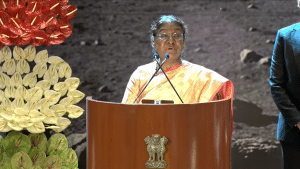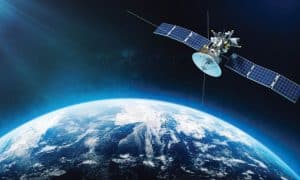India’s journey in the field of space exploration dates back to 1975, with the successful launch of its first satellite, Aryabhatta. Since then, the Indian Space Research Organisation (ISRO) has made remarkable strides in the space sector, leading to India’s recognition as a fully developed space program on the global stage.
Simultaneously, the geospatial industry in India is experiencing rapid growth, spurred by rising demand for geospatial data and services across various sectors such as agriculture, forestry, urban planning, and disaster management. It is projected that the Indian geospatial market will be valued at over INR 63,100 crores by 2025.
In the last session of the day, Sanjay Kumar CEO of Geospatial World, initiated a discussion amongst the panel on the growth of the Indian Space and Geospatial Industry through collective combined partnerships.
The synergy between the Indian space and geospatial industries holds great promise for driving the country’s economic growth and development. However, the key to fully realizing this potential lies in the establishment of robust partnerships between the government, private sector, and academia.
Focusing on Public Policy and Commercialization
Collaborations between government agencies, private enterprises, and educational institutions can expedite the development of new space and geospatial technologies. For instance, ISRO has already initiated partnerships with various private companies to co-create and launch satellites and launch vehicles.
Sudheer Singh, Director, Outreach and Capacity Development, ISRO, emphasizes the importance of understanding the end-user’s needs, with particular regard to nurturing both the user and infrastructure. He said, “That more than the government, the industry should take the lead in this endeavour.”
SP Agarwal, Director, North East Application Centre, underscores the demand for private players in the North East Region and encourages them to become solution providers rather than mere data providers. He said, “Solution Providers are what’s necessary in increasing collaboration between Govt and Private Players.
The government plays a pivotal role in facilitating the transfer of space and geospatial technologies from ISRO to the private sector, which enhances the competitiveness of Indian companies in the global market.
Kranthi Chand, Head – Strategy & Special Projects, Dhruva Space, envisions mechanisms to create a base for space technology, while Rakshit Bhatt, Co-Founder and VP of Product Development, GalaxEye, advocates for democratization of companies to ensure widespread access to space tech innovation.
Indigenization of Space Tech
Nearly 95% of the components used in the rockets, including those used in Chandrayaan 3 mission, were made in India and were a result of several years of development involving the Indian Space Research Organisation and Indian industries. To nurture a skilled workforce in the space and geospatial sectors, the government and private sector can collaborate on developing training programs and other initiatives. This approach will help build a pool of qualified talent to support industry growth.
Ramya Mohan, Chief Strategy Officer, Cyient, highlights the ever-evolving nature of technology and how data capture is a key driver for adaptation. Saurabh Rai, CEO, Arahas Technologies, emphasizes the need for system integrators who understand the landscape and can hire solution providers.
Promoting Indian space and geospatial products and services in the global market can be achieved through trade shows, exhibitions, and promotional activities, with the government playing a central role.
Deven Laheru, CEO, ScanPoint Technologies, champions public-private partnerships, focusing on societal benefits rather than just revenue models.
Abhilasha Purwar, CEO, BlueSky Analytic, emphasizes the government’s reliance on private players for innovative solutions.
Neel Mehta, Co-Founder, Asteria Aerospace Ltd, calls for the democratization of data, making it freely accessible to all.
The success of the Indian space and geospatial industry hinges on partnerships that prioritize the end user’s needs, commercialization, innovation, democratization of companies and data, and the promotion of Indian space technology. These efforts will collectively fuel the growth of these industries, creating jobs, boosting economic growth, and helping India achieve its national development objectives.









